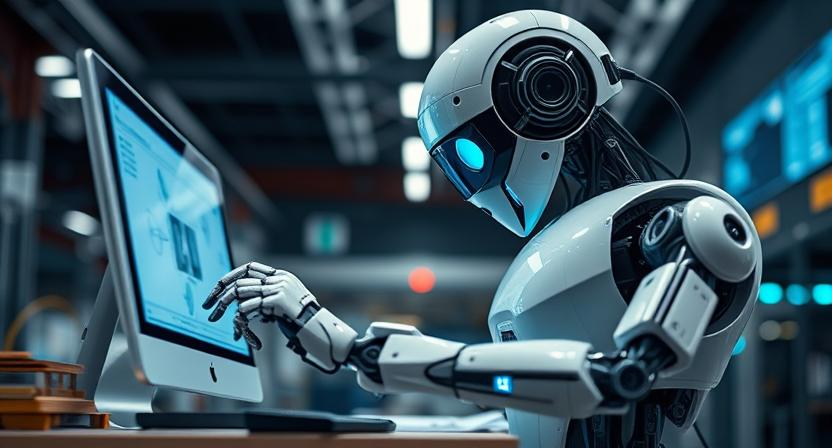The era of automation has come, everywhere the use of robots, AI, and software is increasing rapidly. People are worrying that “Will automation take jobs?” or “Will it create new career opportunities?” This is a big question and there is no simple answer.
Automation is like a double-edged sword, on one side it makes manual and repetitive tasks easier to do by using automation techniques, increasing productivity, and creating new job opportunities for the people who can manage these automation tools. And the other side, it is replacing many traditional jobs.
So now it is important to understand how automation is leaving its impact on the market and how we can get new opportunities by upgrading our skills.
What is Automation and how does it work?
The meaning of automation is simple, automation means automating tasks with the help of AI, Machines, and Software which we humans used to do manually.
- Robots are being used in factories for assembling things.
- Chatbots are being used in customer service for customer support instead of humans.
- Self-checkout machines replacing cashiers.
- In the banking sector, AI bots are being used for automated trading.
- In healthcare robotic surgeries are being done which are helping senior doctors by replacing the junior doctors.
So basically, automation is making its place everywhere. But there is also another side which is having a direct impact on jobs.
Which Jobs Have More Risk?
Automation first targets the repetitive and predictable jobs that are done in a pattern and do not require any human creativity. See which jobs are most at risk:
A. Blue-Collar Jobs
- Factory Workers: The demand for manual labor is decreasing due to machines and robotics.
- Truck & Taxi Drivers: Self-driving cars may reduce the need for drivers in the future.
- Retail Cashiers: Self-checkout systems and online shopping have reduced their demand.
B. White-Collar Jobs
- Data Entry Clerks: AI-based software does fast and accurate data processing.
- Bank Tellers: Online banking and mobile apps have reduced physical bank visits.
- Customer Support Agents: AI chatbots are working 24/7, so companies are using them in place of human agents.
According to the report, 20 million jobs can be eliminated by 2030 due to AI and automation. This is a big challenge, but it also has a solution.
How will new jobs be created through automation?
If automation is taking away some jobs, it is creating new job opportunities too. See, how many new career options increasing because of it:
- AI Engineers & Developers – Demand for people creating AI and automation tools is increasing.
- Cybersecurity Experts – The more automation increases, the more security risks will increase, so the demand for cybersecurity experts will also increase.
- Data Scientists & Analysts – Skilled people are required to analyze data of AI and automation.
- Robot Maintenance & Programming – Experts are needed to maintain machines and robots.
- Digital Marketing Experts – The demand for people who operate automated marketing tools is increasing.
This means, If automation is taking jobs, it is also giving career opportunities. You just have to upgrade yourself.
Which skills are necessary for future jobs?
If automation is impacting jobs then upgrading your skills is the obvious solution. These are some such skills that will make you future-ready:
A. Technical Skills
- AI and Machine Learning – It is important to learn to develop and operate AI and automation tools.
- Software Development & Coding – Learning Python, Java, and automation scripting will be helpful.
- Cloud Computing & Cybersecurity – In the digital world knowledge of cybersecurity and cloud is very important.
B. Soft Skills
- Creativity & Innovation – Robots and AI can do repetitive work, but only humans can do creative tasks.
- Problem-Solving & Critical Thinking – Solving a complex problem is a very valuable task that can be done by humans only. Even, AI and Machine learning have been invented to solve human problems. If we do not have to do repetitive and boring this we can use our time
- Emotional Intelligence – There will always be a need for emotional intelligence in customer relations and human-centered jobs.
Role of Government and Companies: How to Balance Automation?
The impact of automation depends on government policies and company strategies. Several countries and large companies are taking initiatives to tackle the problem:
A. Reskilling Programs
- In countries like Germany, and Canada free skill development programs are being run so that workers can train for new roles.
- India also has Digital India and Skill India programs. Efforts are being made to balance the effect of automation.
B. Universal Basic Income (UBI)
Some futurists are suggesting that if automation reduces jobs then the government should provide a basic income to jobless people to meet people’s needs.
C. Companies Ka Role
- Big companies are giving their employees the opportunity to learn new skills.
- Giants like Google and Amazon running reskilling and upskilling programs to minimize the risk of job loss due to AI and automation.
Do Not Fear Automation But Understand it
The impact of automation on jobs cannot be avoided, but if we learn the right skills and focus on new opportunities, automation could be the beginning of a new era.
Key Takeaways:
- Repetitive jobs are at high risk but we are getting opportunities for new technical and creative jobs.
- Reskilling and upskilling are necessary so that it can be adapted with automation.
- Governments and companies are looking for solutions so that you can avoid job loss due to automation.
- Automation will replace jobs, but it will also open career paths.
So friends, start learning new skills right now and use automation in your favor.
